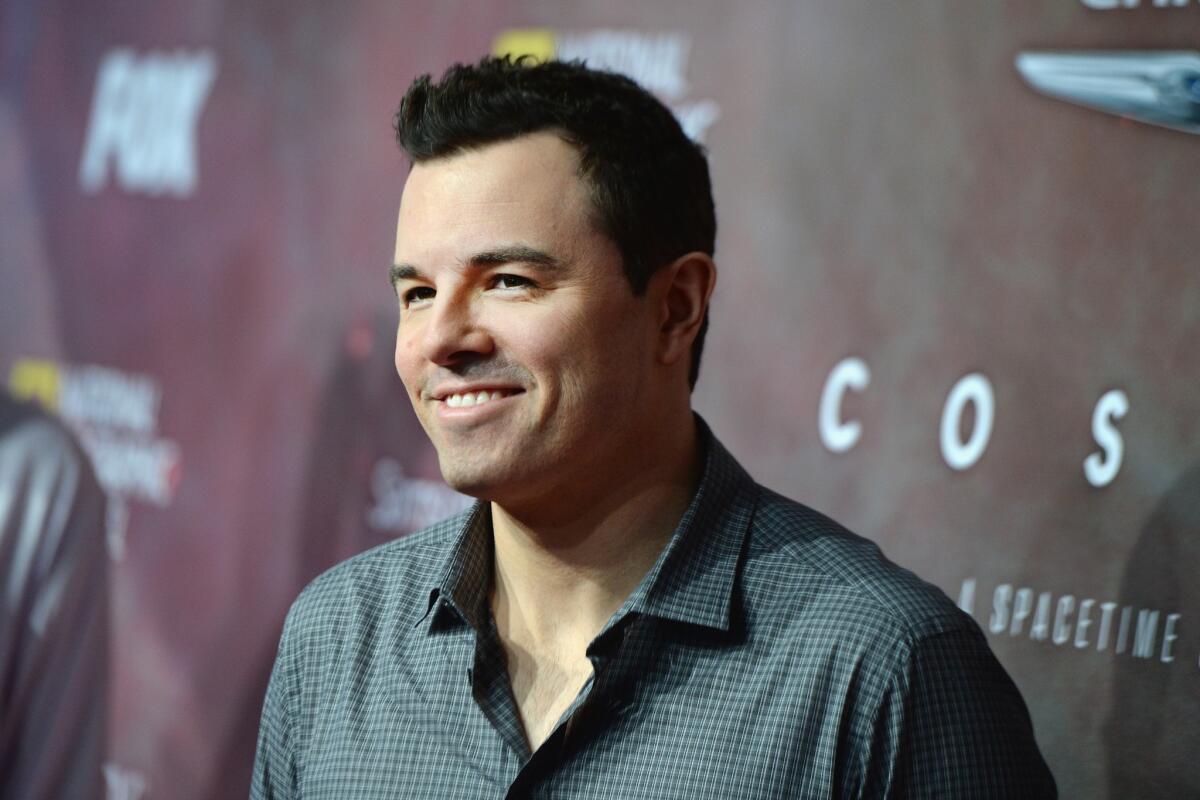Seth MacFarlane hopes ‘Cosmos’ counteracts ‘junk science,’ creationism

- Share via
“Cosmos: A Spacetime Odyssey,” is a 21st-century reboot of the groundbreaking 1980 PBS series “Cosmos: A Personal Voyage.” The original, hosted by renowned astronomer Carl Sagan, was a top-rated phenomenon that has been viewed by some 750 million people around the world. Executive producer Seth MacFarlane hopes the new version will prove just as popular, and help remedy what he sees as a growing problem of scientific illiteracy. We talked to the “Family Guy” creator about the series, his interest in science, and what he thinks we need to do to get back on track.
How did you get involved in “Cosmos”?
I had met [host] Neil [deGrasse Tyson] through Jerry Zucker’s Science and Entertainment Exchange. I was crossing paths with him at their events and I always thought to myself, I have a connection there to the scientific community and things are going well financially and I wanted to see what I could do to throw some of this extra money around in a positive way. Science is, in many ways, more and more underfunded. I was thinking in terms of research projects, I asked him if there were any research projects that need funding in any field of science. And he said, “Well, not off hand but one thing that may need some help is we’re trying to get ‘Cosmos’ rebooted.”
WATCH: ‘Cosmos’ Q&A with Neil deGrasse Tyson, Seth MacFarlane
At the time I had the questionable idea of bringing it to Fox. The regime that’s at Fox now, Peter Rice and Kevin Reilly, is a particularly open-minded, creative-thinking regime. I thought if anybody was going to respond to this idea, it would be them. I took Neil and Ann Druyan to meet with them and sure enough they did it. I understand their thinking was this is just out of the box and unprecedented enough and crazy enough to be something we wanted to do. The show itself does have a legacy and has a history, but part of it was two network executives thinking in a way that not enough network executives think anymore. With Brandon Tartikoff gone there aren’t that many people left. I don’t think it had anything to do with the fact that I was passionate about it. I think they were interested themselves.
So you think even if you hadn’t been involved, Fox would have been excited about it?
I do. I think I maybe helped them get the meeting a little quicker. I do think that if somebody else brought them this pitch they would have responded. They’re unusual guys and it’s one of the reasons that I’ve stayed there as long as I have.
The perception is that it’s risky for a broadcast network like Fox to broadcast a documentary series in prime time.
Absolutely. Reilly’s a guy who thrived on risky over at NBC and it worked well for him, Peter Rice is a guy who thrived on risky over at Fox Searchlight. They’re not afraid to take risks and it pays off for them much more often than not. Even now, with the simulcast launch where they’re broadcasting the premiere on all the Fox channels, they’re showing us again that they’re in this for the long haul. They like the risk factor and in TV now that is what pays off, it’s always interesting to me that so few networks are into taking risks like this and I hope for the sake of “Cosmos” that it pays off, but I also hope for their sake their gamble pays off.
PHOTOS: Celebrities by The Times
When “Cosmos” was announced, many people were surprised by your involvement.
“Family Guy” is a show that dabbles in science fiction now and then. To fans of the show I don’t think it’s that surprising, animation and science, there’s always been some sort of crossover in those two worlds of nerddom. Certainly I think to the press it was somewhat surprising, they sort of have their preconceived notions of what it is that I do. I’ve read many reviews of “Family Guy” and other things that I’ve done by people who sound conspicuously like they’re just hearing about it from their buddies and maybe they’re not actually doing the work. It’s not surprising that that would be something that would raise some eyebrows to those people.
You’ve been urging your followers on Twitter to watch the show. What are you hoping they get out of it?
For argument’s sake, let’s say “Family Guy” is not family-friendly, then I would say “Cosmos” is the first thing that I’ve done in my career that you can sit down with your entire family. It’s for young people and old people. I think there will be a lot of crossover from the animated shows to this program, I think that there is a hunger for science and knowing about science and understanding of science that hasn’t really been fed in the past two decades. We’ve had a resurgence of creationism and intelligent design quote-unquote theory. There’s been a real vacuum when it comes to science education. The nice thing about this show is that I think that it does what the original “Cosmos” did and presents it in such a flashy, entertaining way that, as Carl Sagan put it in 1980, even people who have no interest in science will watch just because it’s a spectacle. People who watched the original “Cosmos” will sit down and watch with their kids.
What are your memories of the original?
I just remember never being bored. I still remember that first episode with Carl and the ship of the imagination taking us from the edge of the known universe back to Earth. That was something that was so memorable to me, that we incorporated the ship of the imagination into the entire series, it functions as a home base for Neil. I think it works really well. Often times when you have a narrator who’s a disembodied voice in a science show it can get a little dry. What Neil does and does so well is he provides that Rod Serling presence. He’s physically there, he’s taking this voyage in the ship of the imagination that functions as a familiar setting. It’s sort of our version of the Bradys’ living room.
ON LOCATION: Where the cameras roll
And what do you think Neil brings to the project that’s unique?
One of the things I love about the fact that Neil is doing this is he can actually back up what he’s saying. He’s not just a celebrity. If somebody approaches Neil after this with a question, he can answer with authority, which is a real plus for me. On a personal level, he’s one of the world’s greatest teachers -- the best teachers are the ones who affect you the most, are the ones who are are enthusiastic. He can talk about the same subject a 100 times and he just never gets bored and his interest is infectious. It just really makes him a really unique communicator of the type that has been lacking immensely in this country since Carl Sagan died. I hope that this show exposes him to many, many more people who maybe don’t know who he is. He’s a powerful voice that has potential to help get us back on track as far as our decaying scientific literacy and our decaying interest in things like space travel.
What do you think needs correcting? How have we gone off track?
You look back at the ‘60s and ‘70s and there was great pride in scientific achievement in this country, particularly in the area of space travel. Our advancements as human beings were important to us and something that we wanted to see continue to evolve. In 1969, we all thought that we would have a permanent manned presence on the moon by the year 2000. And then in 2012 Newt Gingrich suggested we should have a moon base and everyone thought he was crazy. And I was thinking, I’m a liberal Democrat but I’m 100% with this guy. He’s exactly right. They thought this would happen 10 years ago and here he is making this suggestion and suddenly he’s a crackpot. I think that’s one reason to get back on track.
The space program has decayed to a point that is incredibly depressing. We as a species are explorers. Why are we stopping? We’ve seen the rise of junk science, of charlatans who are telling us to not vaccinate our children. I just read about this measles outbreak in Massachusetts. For the love of God, don’t listen to Jenny McCarthy. She’s not a doctor.
PHOTOS: Behind the scenes of movies and TV
You see it in the rise of schools questioning evolution, all these things piling up that betray the fact that we’ve lost our way in terms of our scientific literacy and it’s incredibly damaging to the evolution of any society. I thought we solved this whole evolution thing years and years ago but I guess not, I guess it still needs to be explained. There are a number of areas where scientific illiteracy rears its head. I think in a lot of cases, it’s not a conscious rejection, it’s just that there’s nothing out there that’s feeding that hunger that maybe they don’t know that they have.
In the ‘90s, there were sci-fi shows on TV that at least made an attempt to explore things like quantum physics that have some basis in reality of theoretical physics, and now we get vampires, witches and zombies, which is also a symptom of that. What we’re leaning towards in our fiction preferences can be explained by the decay of scientific literacy. I think if “Cosmos” does its job, it will serve as a reminder that we were doing a pretty good job 40 years ago and it may be time to get a little bit more ambitious again.
ALSO:
Original ‘Cosmos’ series to air before new ‘Cosmos’ debuts
Watch a ‘Cosmos’ Q&A with Neil deGrasse Tyson, Seth MacFarlane
Neil deGrasse Tyson to lead viewers on ‘Cosmos: A Spacetime Odyssey’
Twitter: @MeredithBlake
More to Read
The complete guide to home viewing
Get Screen Gab for everything about the TV shows and streaming movies everyone’s talking about.
You may occasionally receive promotional content from the Los Angeles Times.






